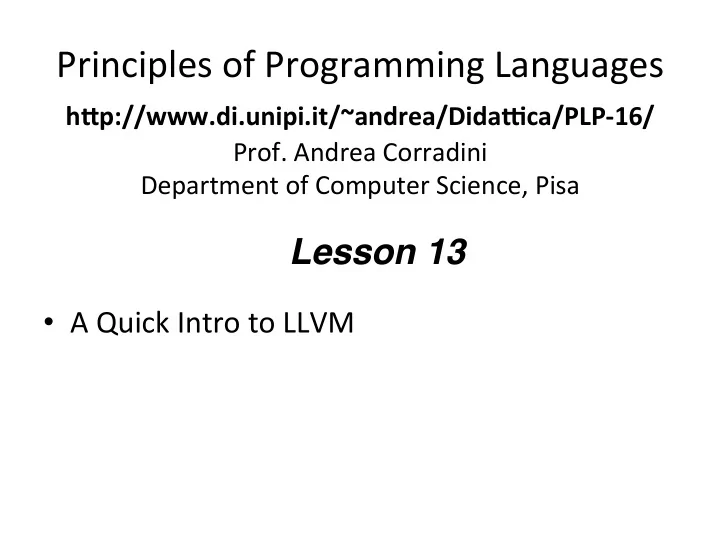

Principles of Programming Languages h"p://www.di.unipi.it/~andrea/Dida2ca/PLP-16/ Prof. Andrea Corradini Department of Computer Science, Pisa Lesson 13 � • A Quick Intro to LLVM
What is LLVM? LLVM is a compiler infrastructure designed as a set of reusable libraries with well-defined interfaces � [ Wikipedia ]: :@@ : • Implemented in C++ 6D6 A*B* !"#$%%&# '(%)(*++,-)# • Several front-ends &*-).*)/ IIJ!#;7 • Several back-ends E#6-*&"F/F 8967: C%(1(*- 9%?/(9: E#G'H+,0*H%-F • First release: 2003 67! !"#$(*0"# • Open source $%+'.1/(# 345 *($2,1/$1.(/ • hPp://llvm.org/ !;98 /1$<<< 9=> ia.org/wiki/LLVM* � 2
LLVM is a CompilaRon Infra-Structure • It is a framework that comes with lots of tools to compile and opRmize code. $> cd llvm/Debug+Asserts/bin � $> ls � FileCheck count llvm-dis llvm-stress � FileUpdate diagtool llvm-dwarfdump llvm-symbolizer � arcmt-test fpcmp llvm-extract llvm-tblgen � bugpoint llc llvm-link macho-dump � c-arcmt-test lli llvm-lit modularize � c-index-test lli-child-target llvm-lto not � clang llvm-PerfectSf llvm-mc obj2yaml � clang++ llvm-ar llvm-mcmarkup opt � llvm-as llvm-nm pp-trace llvm-size � clang-check llvm-bcanalyzer llvm-objdump rm-cstr-calls � clang-format llvm-c-test llvm-ranlib tool-template � clang-modernize llvm-config llvm-readobj yaml2obj � clang-tblgen llvm-cov llvm-rtdyld llvm-diff � clang-tidy � ��
LLVM is a CompilaRon Infra-Structure • Compile C/C++ programs: $> echo "int main() {return 42;}" > test.c � $> clang test.c � $> ./a.out � $> echo $? � 42 � clang/clang++ are very compeRRve when compared with, say, gcc, or icc. Some of these compilers are faster in some benchmarks, and slower in others. Usually clang/clang++ have faster compilaRon Rmes. The Internet is crowded with benchmarks.
OpRmizaRons in PracRce • The opt tool, available in the LLVM toolbox, performs machine independent opRmizaRons. • There are many opRmizaRons available through opt. – To have an idea, type opt --help. � The front-end Machine independent Machine dependent that parses C optimizations, such as optimizations, such into bytecodes constant propagation as register allocation ../0 %"&'( *+, ""% !"#$% !"#$)% !"#$)% !"#$-
OpRmizaRons in PracRce $> opt --help � Optimizations available: � -adce - Aggressive Dead Code Elimination � -always-inline - Inliner for always_inline functions � -break-crit-edges - Break critical edges in CFG � -codegenprepare - Optimize for code generation � -constmerge - Merge Duplicate Global Constants � -constprop - Simple constant propagation � -correlated-propagation - Value Propagation � -dce - Dead Code Elimination � -deadargelim - Dead Argument Elimination � -die - Dead Instruction Elimination � -dot-cfg - Print CFG of function to 'dot' file � -dse - Dead Store Elimination � -early-cse - Early CSE � -globaldce - Dead Global Elimination � -globalopt - Global Variable Optimizer � -gvn - Global Value Numbering � -indvars - Induction Variable Simplification � -instcombine - Combine redundant instructions � -instsimplify - Remove redundant instructions � -ipconstprop - Interprocedural constant propagation � -loop-reduce - Loop Strength Reduction � -reassociate - Reassociate expressions � -reg2mem - Demote all values to stack slots � -sccp - Sparse Conditional Constant Propagation � -scev-aa - ScalarEvolution-based Alias Analysis � -simplifycfg - Simplify the CFG � ... �
Levels of OpRmizaRons • Like gcc, clang supports different llvm-as is the LLVM assembler. It reads a file containing human- levels of opRmizaRons, e.g., -O0 readable LLVM assembly (default), -O1, -O2 and -O3. language, translates it to LLVM • To find out which opRmizaRon bytecode, and writes the result each level uses, you can try: into a file or to standard output. $> llvm-as < /dev/null | opt -O3 -disable-output -debug-pass=Arguments � Example of output for –O1: -targetlibinfo -no-aa -tbaa -basicaa -no\ -globalopt -ipsccp -deadargelim -instcombine -simplifycfg -basiccg -prune-eh -inline-cost -always-inline -funcRonaPrs -sroa -domtree -early-cse -lazy-value-info -jump-threading -correlated-propagaRon -simplifycfg - instcombine -tailcallelim -simplifycfg -reassociate -domtree -loops -loop-simplify -lcssa -loop-rotate -licm -lcssa -loop-unswitch -instcombine -scalar-evoluRon -loop-simplify - lcssa -indvars -loop-idiom -loop-deleRon -loop-unroll -memdep -memcpyopt -sccp - instcombine -lazy-value-info -jump-threading -correlated-propagaRon -domtree - memdep -dse -adce -simplifycfg -instcombine -strip-dead-prototypes -preverify - domtree -verify
Virtual Register AllocaRon • One of the most basic opRmizaRons that opt performs is to map memory slots into register. • This opRmizaRon is very useful, because the clang front end maps every variable to memory: int main() { � int c1 = 17; � int c2 = 25; � int c3 = c1 + c2; � printf("Value = %d\n", c3); � } � $> clang -c -emit-llvm const.c -o const.bc � � $> opt –view-cfg const.bc �
Virtual Register AllocaRon • One of the most basic opRmizaRons that opt performs is to map memory slots into variables. • We can map memory slots into registers with the mem2reg pass: int main() { � int c1 = 17; � How could we int c2 = 25; � further opRmize int c3 = c1 + c2; � this program? printf("Value = %d\n", c3); � } � $> opt -mem2reg const.bc > const.reg.bc � � $> opt –view-cfg const.reg.bc �
Constant PropagaRon • We can fold the computaRon of expressions that are known at compilaRon Rme with the constprop pass. What is %1 in the $> opt -constprop const.reg.bc > const.cp.bc � lea CFG? And what � is i32 42 in the CFG $> opt –view-cfg const.cp.bc � on the right side?
Recommend
More recommend